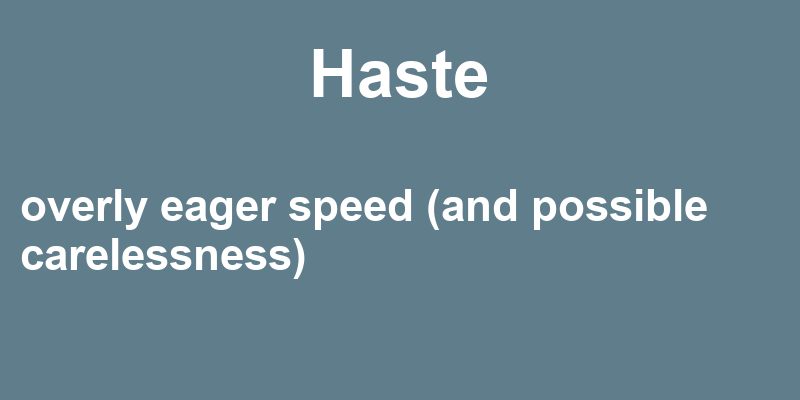
For every student, at any age, studying structures and relationships before studying the grapheme-phoneme correspondences makes those critical concepts easier to understand.Īnd who knows, students may even be inspired to create riddles! This is why it’s so powerful to start word study of any kind by thinking about the structure and relatives of a word.
THE MEANING OF HASTEN HOW TO
As a result, my student easily understood how to spell, expanded his vocabulary, and learned more about how the English spelling system works. When my student and I encountered the word, we analyzed its structure and thought about its relatives before we tried to understand the relationship between its spelling and pronunciation.

So the is retained in even though it’s not pronounced. It’s no longer needed for pronunciation after the suffix is added, but in English, whenever possible, spelling remains consistent even when pronunciation varies - a critical factor for reading comprehension. It’s clear that the is needed in the words to signal the /t/ in their pronunciation.

If we start with the structure, meaning, and relatives of the word, it really doesn’t have to be any more complicated than that.Īnd do you see the reason that the letter makes sense? Think about roughen and sadden and quicken.Īnd now we can turn to pronunciation: the pronunciation of the in fasten and hasten makes sense if we think about the pronunciation of fast and haste. In these two words, the suffix forms a verb and lends the base a sense of “making or becoming.” That suffix has the same function in many other English words. And this usage of the word was brand new for my student, who was entranced by the idea that fast can have at least three senses including “firmly fixed or attached” as in this example: “The ship was held fast by the rope.” Have you ever thought about the idea that to fasten something means to “make it fast” or “make it firmly fixed or attached”? I certainly never had! Although I knew this particular usage of fast, I had never thought of its connection to fasten. When my student and I analyzed, we both were astonished to realize that it was a complex word built from the base. (The slash mark / at the end of signals that we replace a final, non-syllabic or non-pronounced at the end of a stem when we add a vowel suffix, as in. However, we can understand what’s going on by first looking at the structure and relatives of these two words:

We can’t go directly from pronunciation to spelling - or vice versa - and have these words make sense. So why do we pronounce the in as a “long a” while the in is a “short a”? Can we make sense of the relationship between the spelling and pronunciation in these words by pronouncing them and trying to sound them out? Can we make sense of the relationship by looking at their spellings and trying to “decode” them - dividing by syllable, pronouncing each letter in the word, and blending them together? We can’t. These words look as though they should rhyme, but they don’t. And the pronunciation-spelling relationship seems even more confusing if we compare with. The written word is often described as “irregular” because the is not pronounced. The word he was thinking of was fast and his riddle was inspired by studying the spelling of fasten. After studying a word, one of my students created a riddle: “What word means ‘going quickly,’ ‘standing still,’ and ‘not eating’?”


 0 kommentar(er)
0 kommentar(er)
